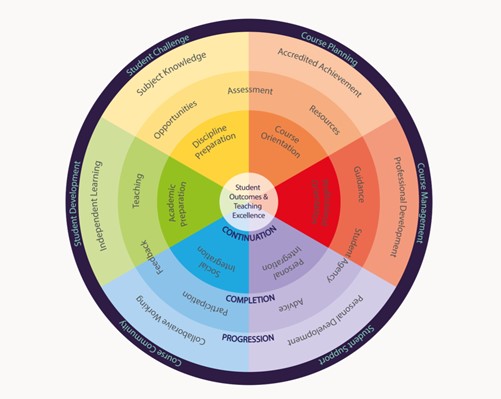Leeds Beckett University - City Campus,
Woodhouse Lane,
LS1 3HE
excellent academic practice
Academic practices are practices that impact on academic and educational outcomes. Educational outcomes are measured in terms of the proportion of students on a course who continue on the course, complete the course, and progress from the course to graduate employment.
To continue, complete and progress, any student needs to navigate a learning pathway though their course. Excellent academic practices that enable all students to participate and succeed are required to achieve excellent educational outcomes.
We can think about developing excellent academic practice in two ways:
- How to improve student outcomes on a course – student continuation, completion and progression.
- How to develop an inclusive course that enables all students to navigate learning pathways through a course.
The diagram below shows, in overview, the functions that any course must provide to inclusively scaffold student engagement. Moving from the centre outwards, the course functions required for student continuation, completion and progression (educational outcomes) are aligned. Course planning, course management, student support, course community, student development and student challenge provide an inclusive framework for students to engage behaviourally, personally, socially and/or conceptually with their course. As they navigate their learning pathway, a student’s transition into, between levels, and from a holistically designed course is critical to their success.
Course functions to achieve excellent educational outcomes (Pickford, 2018)

How to improve Teaching Excellence
The Teaching Excellence Framework (TEF) is a national exercise that aims to assess how providers ensure excellent outcomes for their students. The baseline date on which the TEF draws is:
- Student Outcomes (continuation, completion and progression)
- Student Experience (students’ perceptions of the quality of their course in relation to particular aspects of teaching, assessment, feedback, support and interactions on the course).The student experience data is taken from the National Student Survey (NSS)
How to improve student outcomes
Excellent student continuation requires integrated course-level design of opportunities for student integration, preparation, and orientation. Specifically, each student on the course should have appropriate, tailored opportunities for:
- Personal and social integration
- Academic and disciplinary preparation
- Course and professional orientation
Excellent student completion requires course strategies for assessment, feedback, and student agency. Specifically, students should be able to engage with:
- A constructively aligned curriculum where the course’s learning resources and learning opportunities scaffold a course-level assessment strategy
- Developmental teaching and learning activities where teachers and students participate in feedback to close the gaps between students’ current and required knowledge
- An organised course where appropriate guidance and tailored advice and support empower each student to exercise agency over their learning and engagement
Excellent student progression requires coherent course-level learning pathways that lead to graduate employment. Specifically, graduates should have opportunities to achieve:
- A sought-after qualification accrediting achievement in a relevant subject
- Personal and professional development that empowers the student to navigate a route from the course to graduate employment
- Independent learning and collaborative working
The Centre for Learning and Teaching has collaborated with colleagues from across the institution to bring together resources, links and case studies to help you to
- Improve student continuation on your course
- Improve student completion on your course
- Improve student progression to graduate employment

